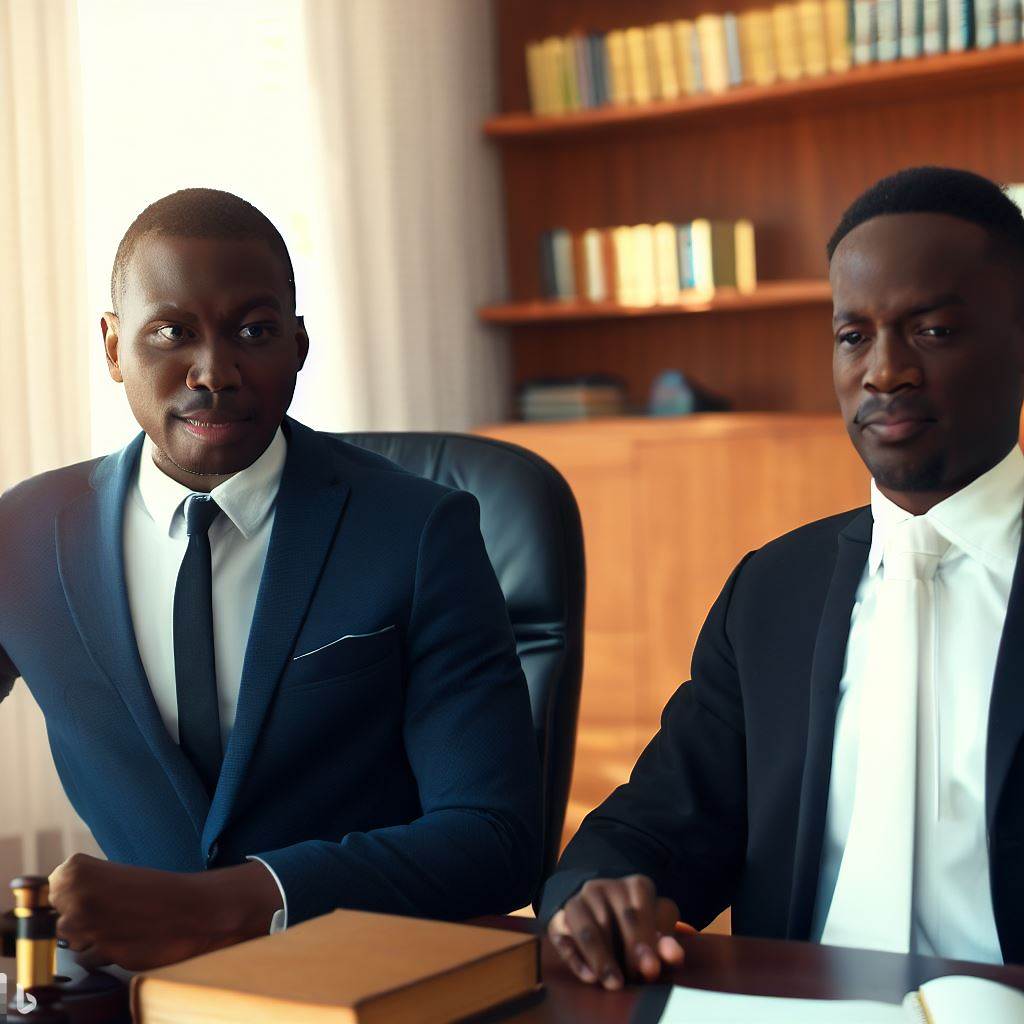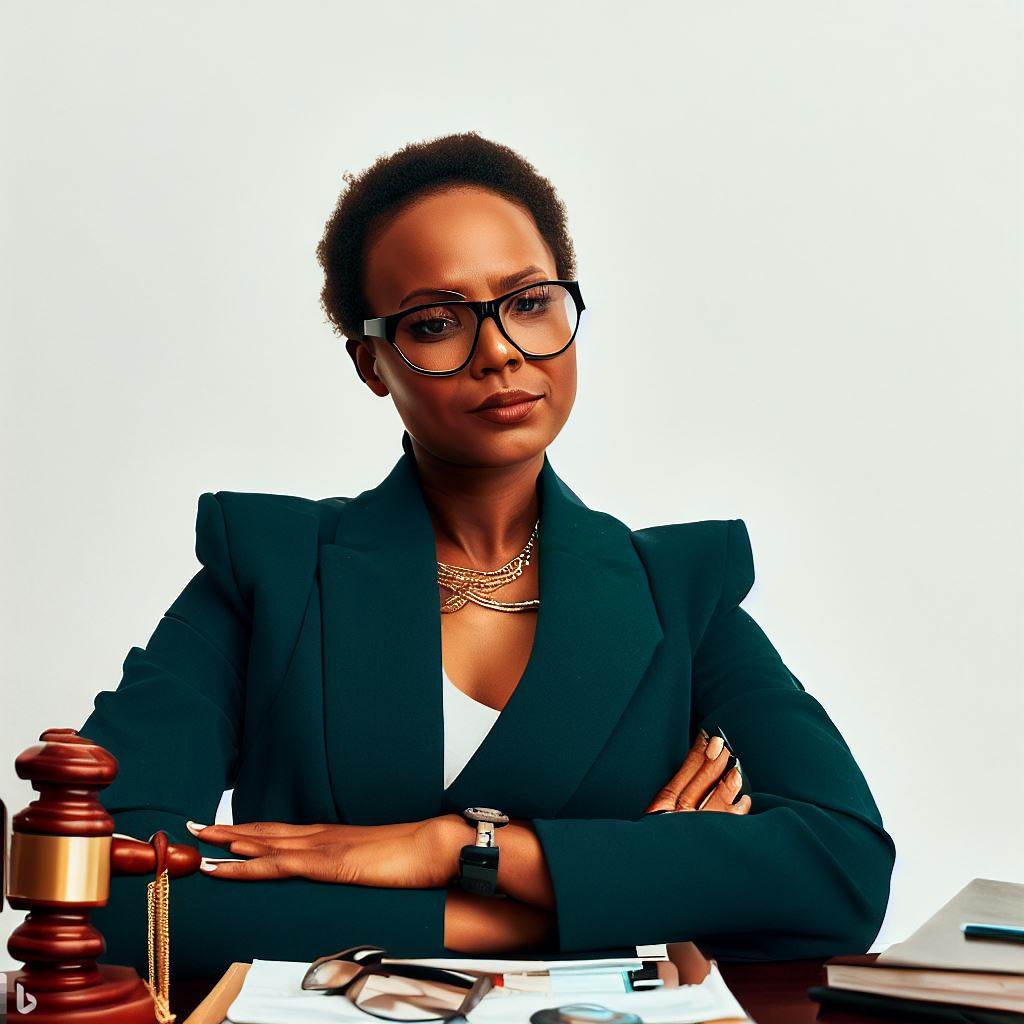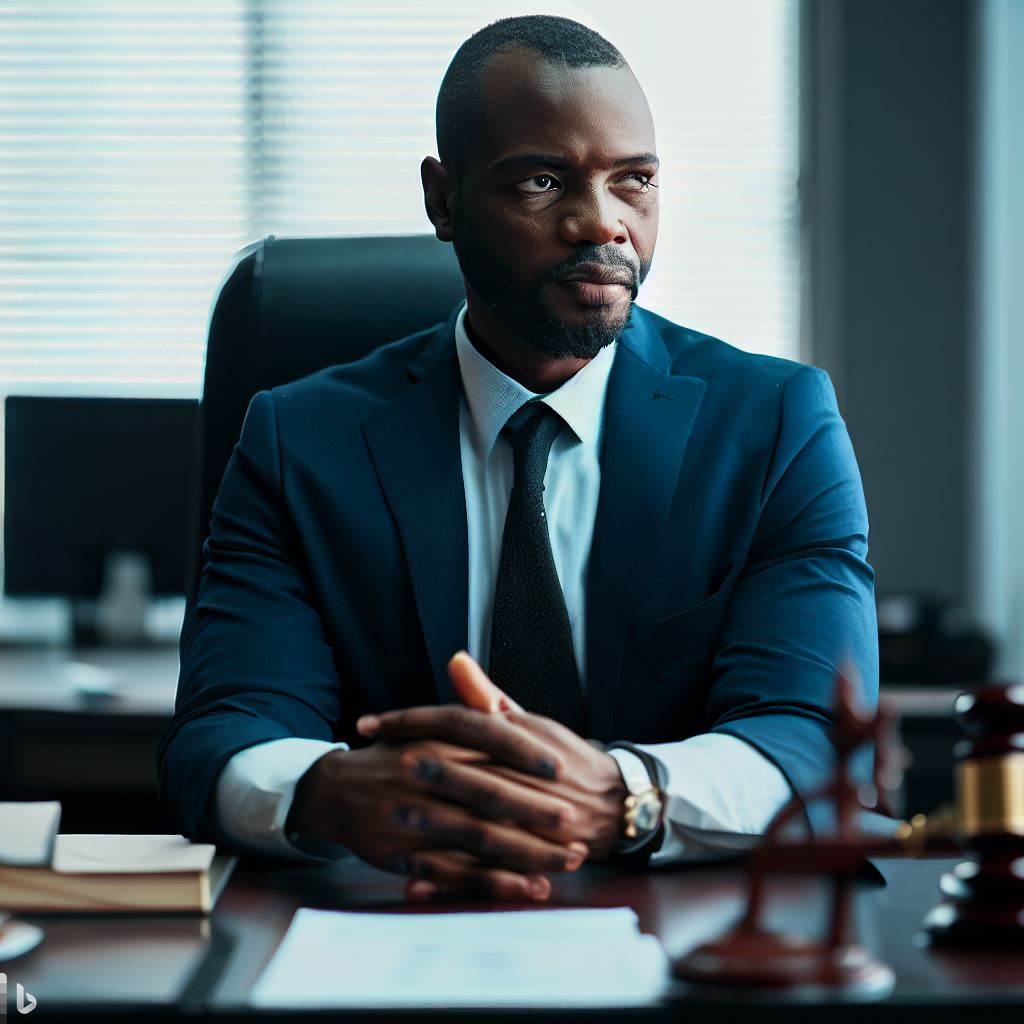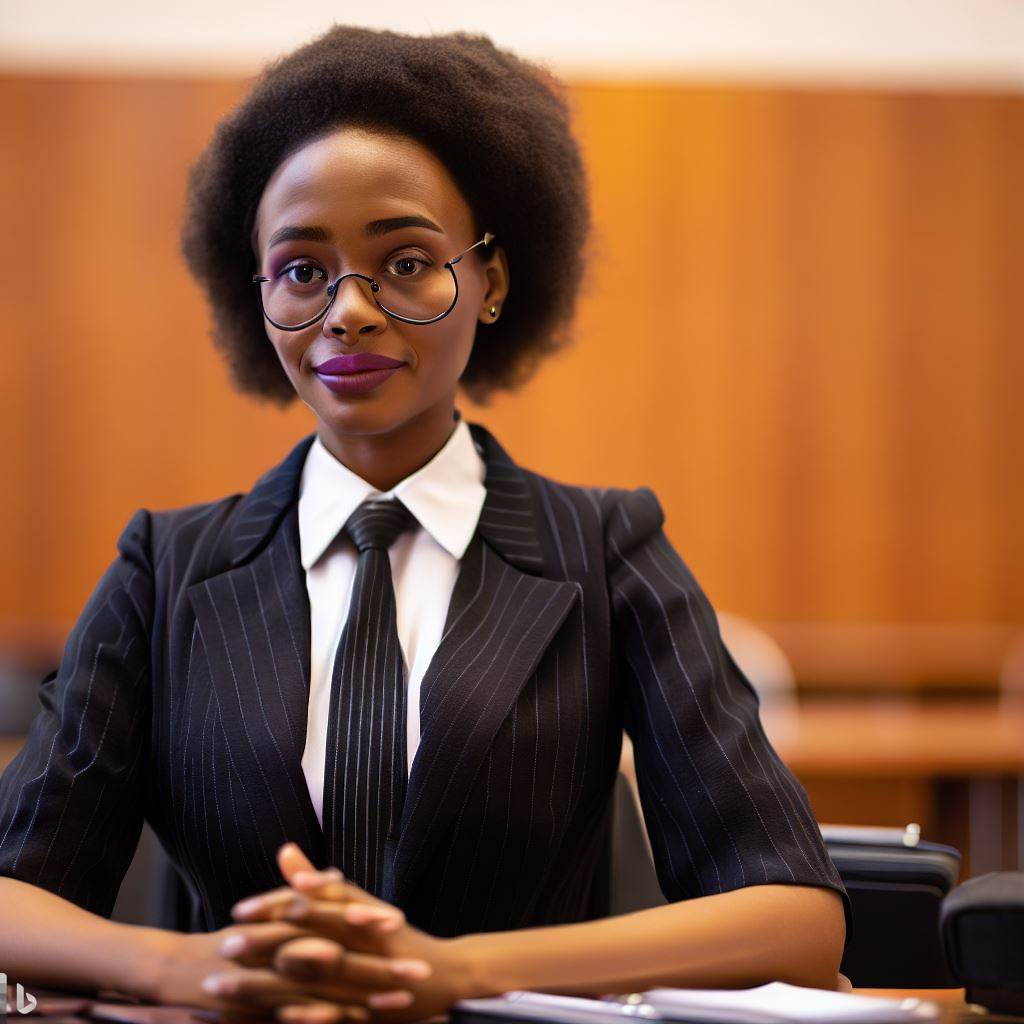Introduction
Welcome to our blog on essential legal advice for Nigerian artists and their managers!
Legal advice plays a crucial role in protecting Nigerian artists and their managers.
The purpose of this blog post is to provide important information on legal considerations.
We will provide a brief overview of key legal aspects that artists and managers must be aware of.
Navigating the world of artistry in Nigeria demands more than just creativity; it requires legal wisdom. This blog post sheds light on the significance of legal counsel for artists and their managers, providing insights into key considerations.
Purpose of the Blog Post
The purpose of this blog post is to underscore the critical role that legal advice plays in safeguarding the interests and careers of Nigerian artists and their managers.
By understanding legal aspects, artists can make informed decisions that protect their intellectual property, earnings, and reputation.
Brief Overview of Key Legal Considerations
- Intellectual Property Rights: Artists need to comprehend copyrights, trademarks, and licensing to safeguard their creations and brand.
- Contractual Agreements: Artists and managers should consult legal experts before signing contracts to avoid exploitative terms.
- Royalties and Compensation: Legal guidance ensures artists receive fair compensation for their work, including royalties from streaming platforms.
- Image Rights and Privacy: Protecting one’s image rights and privacy from unauthorized use is crucial in the digital age.
- Collaborations and Licensing: Artists should understand legal implications before collaborating with others or licensing their work.
- Dispute Resolution: In case of conflicts, having a legal framework in place can expedite resolutions.
- Tax and Financial Obligations: Complying with tax laws and financial obligations prevents legal troubles down the road.
- Touring and Performances: Legal counsel aids in drafting performance agreements and handling potential legal issues during tours.
- Manager-Artist Relationship: Clear legal agreements between artists and managers define responsibilities, commissions, and terms.
- Online Presence: Legal advice ensures that artists’ online presence, including social media, aligns with legal boundaries.
In essence, the importance of legal advice cannot be overstated for Nigerian artists and their managers.
By understanding these legal considerations, artists can focus on their creative endeavors while protecting their rights and ensuring a prosperous career.
Understanding Intellectual Property Rights in Nigeria
Copyright protection for artistic works
- Copyright is a legal right that protects the expression of creative works in Nigeria.
- Nigerian artists enjoy copyright protection for their artistic creations, including paintings, sculptures, music, and literature.
- Copyright gives artists exclusive rights to reproduce, distribute, perform, display, and modify their works.
- It prevents others from using or reproducing an artist’s work without their permission.
- Nigerian copyright laws do not require registration for an artist to enjoy protection.
- However, registration provides strong evidence of ownership and facilitates legal enforcement in case of infringement.
- Artists should include a copyright notice (©), their name, and year of creation on their works for added protection.
Registering copyrights in Nigeria
- Registering copyrights in Nigeria is recommended to enhance legal protection.
- The Nigerian Copyright Commission (NCC) is responsible for copyright registration.
- Registration provides evidence of ownership, making it easier to prove infringement in court.
- To register, artists need to submit the application form, two copies of the work, and the registration fee.
- The NCC examines the application and issues a certificate of registration if requirements are met.
- Copyright registration in Nigeria is valid for the lifetime of the artist plus an additional 70 years after their death.
Importance of trademarks for artists
- Trademarks are crucial for artists to protect their brand identity and avoid confusion with other artists or businesses.
- Artists can register their names, logos, or any distinctive sign as trademarks in Nigeria.
- Trademarks provide exclusive rights to use and license the registered mark for commercial purposes.
- Registering a trademark ensures legal protection against unauthorized use or infringement by others.
- Trademarks increase the economic value of an artist’s brand and prevent dilution of their reputation.
Patents and designs for innovative artistic creations
- Artists who create innovative and functional artistic designs can seek patent protection.
- Patents protect inventions that have a unique or novel aspect, including artistic creations.
- Artists can apply for design patents to protect the ornamental design of a functional item they have created.
- Patent protection prevents others from manufacturing or selling the artist’s invention without permission.
- Artists should consult with a patent attorney to understand the process and requirements for obtaining patent protection.
By understanding intellectual property rights and utilizing legal mechanisms like copyright, trademarks, and patents, Nigerian artists can protect and monetize their creative works effectively.
It is essential to consult with legal professionals to navigate the complexities of intellectual property law and ensure maximum protection for their artistic endeavors.
Read: Changes in the Attorney Profession: Nigeria’s Scenario
Contracts and Agreements
Importance of written contracts
- Written contracts provide legal protection and clarity for Nigerian artists and their managers.
- Without written contracts, misunderstandings and disputes may arise, causing financial and professional harm.
- Written contracts outline the rights, duties, and responsibilities of both parties involved.
Key elements in artist-manager contracts
- Clear identification of involved parties, including their roles and responsibilities.
- Details on the duration and termination clauses of the contract.
- Compensation and revenue sharing agreements between the artist and their manager.
- Provisions regarding booking, touring, promotion, and marketing activities.
- Intellectual property rights, including ownership and usage of the artist’s work.
- Dispute resolution mechanisms, such as arbitration or mediation, to avoid costly litigation.
Understanding record label contracts
- Record label contracts are essential for artists seeking wider distribution and promotion of their music.
- Artists should carefully review and negotiate terms related to album releases, advances, and royalties.
- Key contract elements include the label’s exclusive rights, marketing commitments, and distribution terms.
- Artists should consult legal professionals to ensure fair and favorable contract terms.
Licensing and distribution agreements
- Licensing agreements grant third parties the right to use an artist’s music, artwork, or merchandise.
- Artists should consider the scope, duration, and compensation terms in licensing agreements.
- Distribution agreements establish partnerships with distributors to ensure wide availability of music.
- Important aspects include revenue sharing, territory restrictions, and marketing support.
- Artists should seek legal advice to protect their rights and maximize financial benefits.
Contracts and agreements form the foundation for successful and protected careers for Nigerian artists and their managers.
The importance of written contracts cannot be overstated, as they provide crucial legal protection and establish clear expectations for both parties involved.
Read: The Evolution and History of Legal Professions in Nigeria
Key elements in artist-manager contracts
Key elements in artist-manager contracts are vital to ensure a harmonious working relationship.
These elements should include the identification of involved parties and their specific roles and responsibilities.
Additionally, details on the duration and termination clauses of the contract, compensation and revenue sharing agreements, and provisions related to booking, touring, promotion, and marketing activities are essential for a well-rounded agreement.
Understanding record label contracts
Understanding record label contracts is crucial for artists aiming to reach a broader audience.
Artists should pay close attention to terms related to album releases, advances, and royalties. Exclusive rights, marketing commitments, and distribution terms are also significant elements to consider.
Seeking legal assistance during contract negotiations can help artists secure favorable terms and protect their interests.
Licensing and distribution agreements
These are important for artists looking to expand their reach and monetize their work. Licensing agreements grant third parties the right to use an artist’s music, artwork, or merchandise.
Careful consideration of the scope, duration, and compensation terms is essential.
Distribution agreements establish partnerships with distributors to ensure broad availability of an artist’s music.
Aspects such as revenue sharing, territory restrictions, and marketing support contribute to a mutually beneficial agreement.
Basically, Nigerian artists and their managers must prioritize the establishment of written contracts and agreements.
These legal documents provide protection, clarity, and structure for their professional relationships.
By understanding the key elements involved in artist-manager contracts, record label contracts, and licensing and distribution agreements, artists can navigate the music industry with confidence and maximize their opportunities for success.
Read: Work-Life Balance for Attorneys in Nigeria: A Study
Royalties and Revenue Streams
Overview of royalty types in the Nigerian music industry
- Performance royalties – payment for public performance of music
- Mechanical royalties – payment for the reproduction of music on CDs, streaming platforms, etc.
- Synchronization royalties – payment for the use of music in films, TV shows, advertisements, etc.
- Streaming royalties – payment for the distribution of music on digital platforms
Artists and their managers must be aware of the various royalties and revenue streams in the Nigerian music industry to ensure they receive fair compensation for their work.
Understanding the different royalty types is crucial as it determines how artists are paid for their music.
Performance royalties
Performance royalties are earned when music is performed publicly, such as in concerts, clubs, or on radio and television.
Artists should register their songs with collective management organizations like COSON, MCSN, and PMAN to collect performance royalties effectively.
Mechanical royalties
Mechanical royalties are generated from the reproduction of music on physical and digital formats.
Artists should ensure that they have proper licensing agreements with record labels, streaming platforms, or distributors to receive mechanical royalties for their music.
Synchronization royalties
Synchronization royalties come from the use of music in films, TV shows, advertisements, and other forms of media.
Artists can negotiate synchronization licenses with producers or work with publishing companies to earn revenue from these opportunities.
Streaming royalties
Streaming royalties are an increasingly important revenue stream for artists in the digital age.
Artists should understand how platforms like Spotify, Apple Music, and YouTube distribute royalties and ensure their music is properly registered and monitored.
Collective management organizations in Nigeria
- Copyright Society of Nigeria (COSON)
- Musical Copyright Society of Nigeria (MCSN)
- Performing Musicians Employers Association of Nigeria (PMAN)
Understanding revenue streams beyond music sales and performances
- Merchandising – selling products related to the artist’s brand, such as t-shirts, posters, etc.
- Licensing – granting permission to use an artist’s music in various forms of media
- Endorsements – partnerships with brands for advertising and promotional activities
- YouTube monetization – earning revenue from advertisements on YouTube channels
- Live performances and tours – ticket sales, sponsorships, and merchandise sales at concerts and tours
Merchandising
It is essential for artists and managers to expand their revenue streams beyond music sales and performances. Merchandising is a popular way to generate income, allowing fans to purchase products that promote the artist’s brand.
Licensing
Licensing agreements enable artists to earn revenue by granting permission for their music to be used in commercials, films, or TV shows. These agreements should be carefully negotiated to ensure fair compensation.
Endorsements
Endorsements offer artists the opportunity to partner with brands, promoting their products and earning money in return. Artists should select endorsements that align with their brand and values to maintain authenticity.
YouTube monetization
YouTube monetization is another source of income for Nigerian artists. By allowing advertisements on their YouTube channels, artists can earn revenue based on the views and engagement their videos generate.
Live performances and tours
Finally, live performances and tours are significant revenue streams for artists. In addition to ticket sales, artists can secure sponsorships and sell merchandise at concerts and tours, providing additional income while connecting with fans.
In general, understanding the various royalty types and revenue streams available to Nigerian artists and their managers is essential for maximizing their earnings.
By diversifying income sources and being knowledgeable about collective management organizations, licensing, endorsements, and merchandise, artists can ensure they are fairly compensated for their creativity and hard work.
Read: Technological Influence on the Attorney Profession in Nigeria
Personal Branding and Image Rights
Importance of Building a Strong Personal Brand
- A strong personal brand sets Nigerian artists apart from their competitors in the industry.
- Building a personal brand increases visibility and attracts a larger fanbase.
- A solid personal brand helps artists establish credibility and trust with their audience.
- It allows artists to showcase their unique style, voice, and talents, distinguishing them from others.
- A strong personal brand attracts opportunities for collaborations, partnerships, and endorsements.
- It helps artists create a loyal and engaged following, leading to increased sales and revenue.
- Building a personal brand allows artists to have control over their public image and narrative.
- It can open doors to non-music related ventures such as acting, fashion, and entrepreneurship.
- A well-established personal brand helps artists become influencers and thought leaders in their field.
- It provides a foundation for long-term success, enabling artists to adapt and evolve over time.
Protecting Image Rights and Likeness
- Artistic images, photographs, and videos of Nigerian artists are valuable intellectual property.
- Artists should consider registering their copyright to protect their creative works from unauthorized use.
- Copyright registration provides legal evidence and enables artists to take legal action against infringers.
- Artists should always obtain explicit permission and licensing agreements before using someone’s image.
- Nigerian artists should educate themselves on intellectual property rights and image licensing contracts.
- It is essential to include provisions for image rights and usage in contracts with photographers, labels, and promoters.
- Regularly monitor online platforms and social media for unauthorized use of images or likeness.
- Artists can send cease and desist letters or take legal action against infringers to protect their image rights.
- Collaborate with legal professionals who specialize in intellectual property and copyright law.
Sponsorship and Endorsement Deals
- A strong personal brand can attract sponsorship and endorsement deals for Nigerian artists.
- Artists should carefully consider endorsement agreements to ensure they align with personal values and image.
- Seek legal advice to review contract terms, obligations, exclusivity, duration, and compensation.
- Understand the rights and obligations of both parties involved in the endorsement deal.
- Maintain a professional image and reputation to attract reputable sponsors.
- Clearly define the scope of the endorsement and the approved usage of the artist’s image.
- Understand any confidentiality or non-disclosure provisions within the endorsement contract.
- Ensure that the endorsement agreement includes provisions for terminating the contract if necessary.
- Review how intellectual property rights will be handled within the endorsement agreement.
- Regularly evaluate endorsement opportunities to ensure they align with the artist’s evolving brand.
In short, building a strong personal brand is essential for Nigerian artists to stand out in the competitive industry.
Protecting image rights and likeness through copyright registration and licensing agreements is crucial in preventing unauthorized use.
Sponsorship and endorsement deals can provide financial and brand growth opportunities, but artists should carefully review and negotiate contract terms.
By understanding and actively managing their personal brand and image rights, Nigerian artists can position themselves for long-term success in the industry.

Dealing with Show Promoters and Event Organizers
Key clauses in show contracts
- Define the scope of the performance and responsibilities of both parties.
- Include payment terms, including the amount, due dates, and acceptable methods of payment.
- Specify the duration of the performance, including soundchecks, rehearsals, and the actual show.
- Outline the requirements for technical specifications, such as sound and lighting equipment.
- Detail any promotional obligations for the artist, such as interviews or social media promotions.
- Include provisions for intellectual property rights, ensuring the artist’s work is respected and protected.
- Address any confidentiality requirements, especially for shows that are not open to the public.
Advance payments and performance obligations
- Negotiate a reasonable advance payment clause to secure the artist’s commitment to the show.
- Clearly define the consequences for non-payment, such as cancellation or legal action.
- Specify the timeline for fulfilling performance obligations, including rehearsals and soundchecks.
- Outline the consequences of failure to meet performance obligations, such as reduced payment.
- Include provisions for extra fees or reimbursements for additional expenses incurred by the artist.
Legal protection against event cancellations
- Include a force majeure clause to protect the artist from unforeseen circumstances, such as natural disasters.
- Define the consequences for event cancellation by the promoter or event organizer, including refunds or rescheduling.
- Specify the timeframe within which the artist must be notified of event cancellation or changes.
- Include provisions for compensation in case of event cancellation, such as a percentage of the agreed fee.
- Ensure the contract specifies which party is responsible for covering any incurred expenses due to the cancellation.
By including key clauses in show contracts, Nigerian artists and their managers can ensure a smooth and fair working relationship with show promoters and event organizers.
These clauses will provide legal protection and define the rights and responsibilities of both parties involved.
Read: Legal Challenges Faced by Attorneys in Nigeria
You Might Also Like: Steps to Becoming a Certified Paralegal in Nigeria
Dispute Resolution and Litigation
Importance of alternative dispute resolution
- Alternative dispute resolution (ADR) offers a more efficient and cost-effective way to resolve conflicts.
- ADR can help to maintain relationships and preserve the reputation of Nigerian artists and their managers.
- It allows parties to have more control over the outcome of their disputes.
- Participating in ADR is often mandatory before proceeding to litigation in Nigeria.
- ADR methods include mediation, negotiation, and arbitration.
Mediation and arbitration
- Mediation involves a neutral third party assisting the parties in reaching a mutually beneficial agreement.
- Arbitration is a less formal process where a neutral arbitrator makes a decision based on the arguments of the parties.
- Both mediation and arbitration are confidential and allow for more flexibility compared to litigation.
- The decisions reached in mediation and arbitration are typically binding on the parties involved.
- These methods offer faster resolutions and are less adversarial than traditional court proceedings.
Understanding the court system in Nigeria
- The court system in Nigeria consists of various levels, including the Supreme Court, Court of Appeal, and High Court.
- The High Court is the main trial court where most civil and criminal cases are initially heard.
- It is important to understand the jurisdiction of each court and the types of cases they handle.
- Nigerian artists and their managers should seek legal representation to navigate through court proceedings.
- Litigation can be a lengthy and expensive process, requiring proper documentation, evidence, and adherence to court procedures.
When it comes to dispute resolution and litigation, Nigerian artists and their managers should prioritize alternative dispute resolution methods.
ADR offers numerous benefits, including cost-effectiveness, relationship preservation, and greater control over the outcome.
Mediation and arbitration are two commonly used ADR methods that provide confidentiality and flexibility.
However, it is crucial to have a good understanding of Nigeria’s court system for cases that require litigation.
Seeking legal representation is recommended to navigate through the complexities of court processes.
By being well-informed and proactive, Nigerian artists and their managers can effectively resolve disputes and protect their interests in the art industry.
Tax Obligations and Financial Management
Tax considerations for Nigerian artists
- Artists in Nigeria have certain tax obligations that they must fulfill.
- Income earned from art sales and performances is subject to taxation by the government.
- It is vital for artists to understand the applicable tax laws and regulations in their jurisdiction.
- They should keep accurate records of their income and expenses to facilitate tax compliance.
- Artists may be required to pay income tax, value-added tax (VAT), and other relevant taxes.
- They should consult with tax professionals or seek advice from qualified accountants to ensure compliance.
- Avoiding taxes or underreporting income can lead to severe penalties and legal consequences.
- Artists should research tax incentives or deductions available to them to minimize their tax liability.
- Understanding tax obligations can help artists plan their finances and avoid unexpected tax burdens.
- Regular updates on tax laws and regulations are essential to stay compliant with changes in the tax system.
Importance of proper financial management:
- Proper financial management is crucial for the success and sustainability of Nigerian artists.
- It allows artists to keep track of their income, expenses, and overall financial health.
- Effective financial management helps artists budget, plan projects, and make informed financial decisions.
- It ensures that artists can fulfill their financial obligations and invest in their careers.
- Artists should maintain separate business and personal bank accounts to track income and expenses accurately.
- Creating a savings plan can help artists prepare for unexpected expenses or financial challenges.
- Regular monitoring of financial statements and cash flows helps artists identify areas of improvement.
- Artists should establish and adhere to a budget to control their spending and allocate funds wisely.
- Proper financial management enhances the artist’s professional reputation and credibility.
- Artists should consider investing in financial management courses or hiring financial advisors for guidance.
Working with qualified accountants and tax advisors:
- Nigerian artists should collaborate with qualified accountants and tax advisors to navigate their financial obligations.
- These professionals can provide expert guidance on tax planning, compliance, and financial management.
- They assist artists in understanding tax laws, regulations, and any available exemptions or incentives.
- Accountants can help artists prepare financial statements, manage budgets, and analyze their financial performance.
- Tax advisors ensure artists file their tax returns accurately and maximize deductions to minimize tax liability.
- Artists should engage professionals with experience in the entertainment industry to ensure industry-specific expertise.
- Regular consultations with accountants and advisors help artists stay updated on their financial and tax matters.
- Clear communication and transparency between artists and financial professionals are vital for effective collaboration.
- Artists should maintain all relevant financial documents and records for easy access and review.
- The relationship with accountants and tax advisors is an ongoing partnership for optimal financial management.
Proper tax obligations and financial management are crucial for Nigerian artists’ long-term success. Working with qualified professionals ensures compliance, minimizes tax liability, and enhances financial stability.
Learn More: The Impact of Copyright Law on Nigeria’s Entertainment Scene
Conclusion
Recap of key legal advice for Nigerian artists and managers
- Understand copyright laws and protect your intellectual property rights.
- Use written contracts for collaborations, performances, and licensing agreements.
- Register your work with the Nigerian Copyright Commission to strengthen your legal position.
- Be aware of your rights as an artist, including moral and economic rights.
- Comply with taxation requirements and keep accurate records of your income and expenses.
Encouragement to seek professional legal guidance
In navigating the Nigerian art industry, it is crucial to have expert legal advice to avoid potential legal pitfalls.
Lawyers specialized in entertainment law can provide valuable guidance on contracts, negotiations, and copyright protection.
They can help protect your interests, ensure fair compensation, and provide solutions when facing legal issues.
Investing in professional legal guidance will safeguard your career and help you make informed decisions as an artist or manager.
Remember, as a Nigerian artist or manager, understanding and complying with the relevant legal frameworks is crucial for your success in the industry.
By following the key legal advice discussed in this post and seeking professional guidance, you can protect your rights, advance your career, and thrive in the Nigerian art scene.




